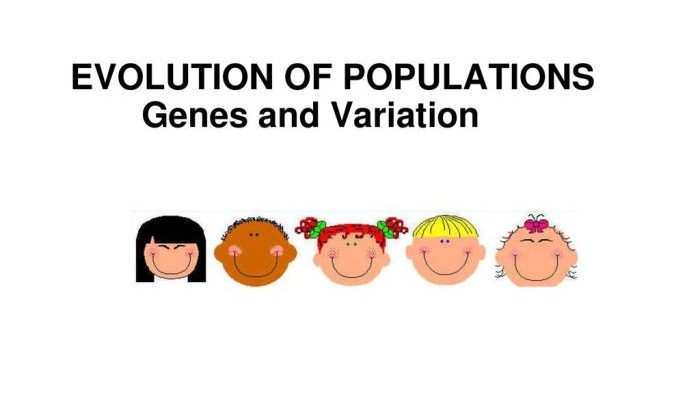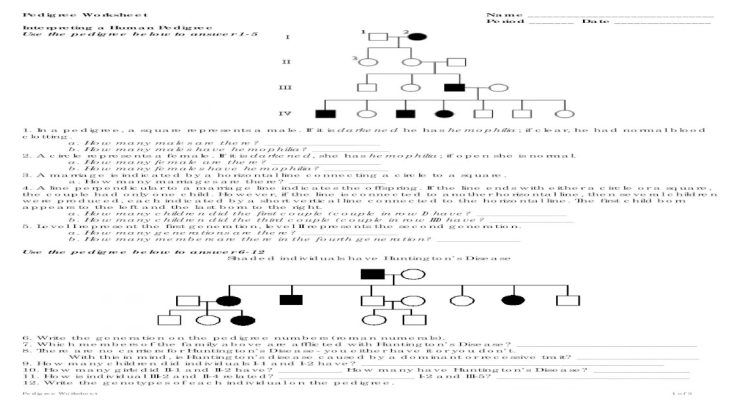Describe an individual with the karyotype shown. This intriguing narrative delves into the fascinating world of genetics, uncovering the significance of karyotypes and their profound impact on an individual’s health. Prepare to embark on a journey of scientific exploration as we analyze a specific karyotype, unraveling its implications and gaining invaluable insights into the intricate tapestry of human genetics.
Karyotypes, the visual representations of an individual’s chromosomes, hold a wealth of information about our genetic makeup. Through the meticulous analysis of these chromosomal arrangements, scientists can identify abnormalities that may underlie a variety of genetic disorders, empowering us with the knowledge to understand and potentially mitigate their impact.
Karyotype Overview: Describe An Individual With The Karyotype Shown.
A karyotype is a visual representation of the entire set of chromosomes in an organism’s cells. It is typically arranged in pairs, with one chromosome from each pair inherited from the mother and the other from the father. Karyotypes can be used to identify chromosomal abnormalities, such as deletions, duplications, inversions, and translocations, which can lead to genetic disorders.
Types of Karyotypes
- Constitutional Karyotype: This karyotype is obtained from cells that are not involved in reproduction, such as blood cells or skin cells.
- Reproductive Karyotype: This karyotype is obtained from reproductive cells, such as sperm or eggs, and is used to assess the potential for chromosomal abnormalities in offspring.
Significance of Karyotypes in Genetic Analysis
Karyotypes are essential tools for genetic analysis and diagnosis. They can be used to:
- Identify chromosomal abnormalities that can lead to genetic disorders
- Determine the sex of an individual
- Study the evolution of species
- Diagnose and manage genetic disorders
Karyotype Analysis
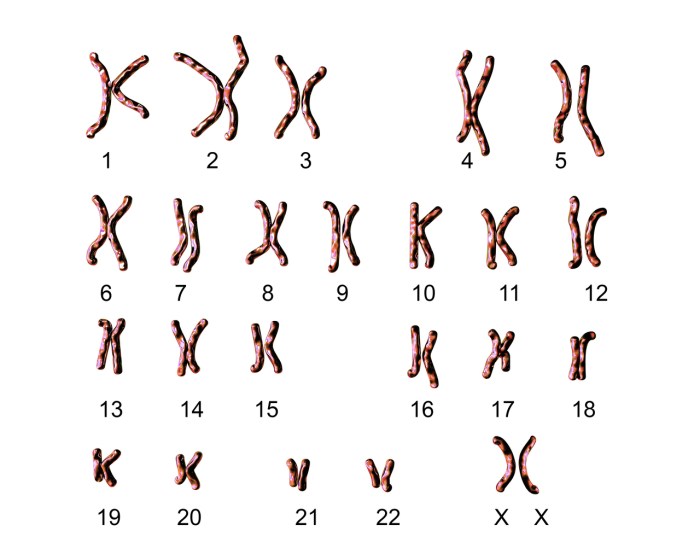
Step-by-Step Process for Analyzing a Karyotype
- Prepare the sample: The sample is typically obtained from blood or bone marrow.
- Harvest the cells: The cells are harvested and treated with a chemical solution to stop cell division.
- Stain the chromosomes: The chromosomes are stained with a dye to make them visible under a microscope.
- Photograph the chromosomes: The chromosomes are photographed using a microscope.
- Analyze the karyotype: The chromosomes are arranged in pairs and analyzed for any abnormalities.
Role of Banding Techniques in Karyotype Analysis
Banding techniques are used to create a unique banding pattern on the chromosomes. This allows for easier identification of individual chromosomes and the detection of chromosomal abnormalities.
Use of Karyotype Analysis in Diagnosing Genetic Disorders, Describe an individual with the karyotype shown.
Karyotype analysis is used to diagnose a wide range of genetic disorders, including:
- Down syndrome
- Trisomy 18
- Turner syndrome
- Klinefelter syndrome
- Cri du chat syndrome
Karyotype Interpretation
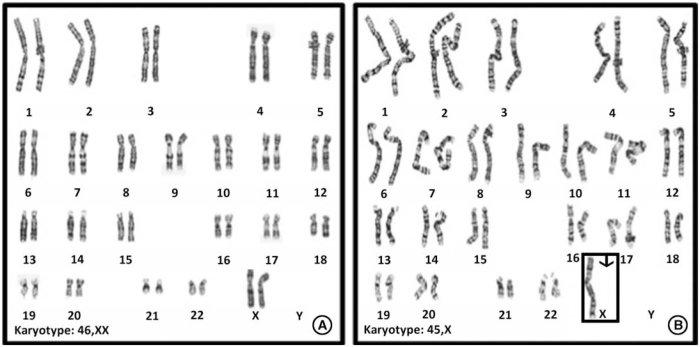
Types of Chromosomal Abnormalities
- Numerical abnormalities: These abnormalities involve changes in the number of chromosomes, such as trisomy (an extra chromosome) or monosomy (a missing chromosome).
- Structural abnormalities: These abnormalities involve changes in the structure of chromosomes, such as deletions, duplications, inversions, and translocations.
Clinical Significance of Chromosomal Abnormalities
Chromosomal abnormalities can have a wide range of clinical consequences, depending on the type and severity of the abnormality. Some chromosomal abnormalities are associated with specific genetic disorders, while others may have no clinical significance.
Examples of Karyotype Analysis in Diagnosing Specific Genetic Disorders
- Down syndrome: This disorder is caused by an extra copy of chromosome 21. Karyotype analysis can be used to confirm the diagnosis of Down syndrome.
- Turner syndrome: This disorder is caused by the absence of one X chromosome in females. Karyotype analysis can be used to confirm the diagnosis of Turner syndrome.
- Klinefelter syndrome: This disorder is caused by an extra X chromosome in males. Karyotype analysis can be used to confirm the diagnosis of Klinefelter syndrome.
Case Study: Karyotype Analysis of an Individual
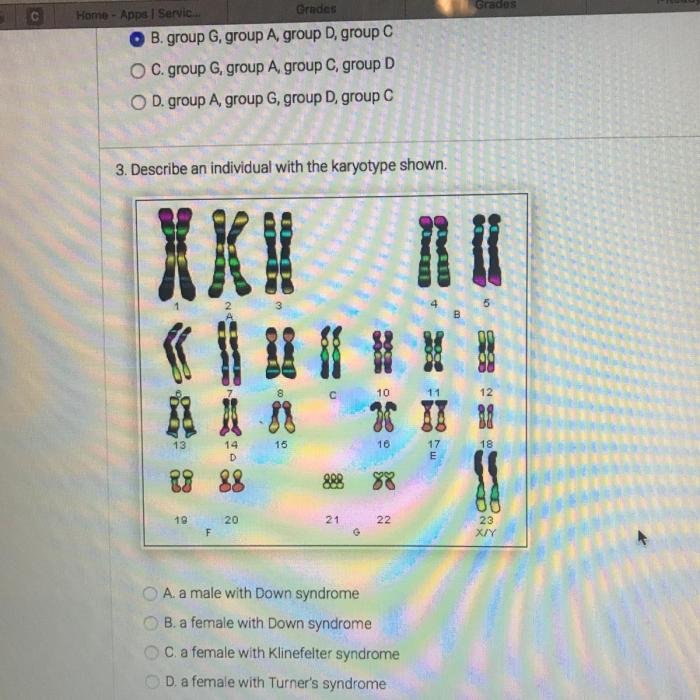
An individual with the karyotype 46,XY,del(5)(q13q22) has a deletion of the long arm of chromosome 5 from band q13 to band q22. This deletion is associated with cri du chat syndrome, a rare genetic disorder characterized by a high-pitched cat-like cry, intellectual disability, and distinctive facial features.
Karyotype Analysis
The karyotype was analyzed using the following techniques:
- G-banding: This technique stains the chromosomes with a dye that produces a unique banding pattern.
- FISH: This technique uses fluorescent probes to identify specific regions of chromosomes.
Interpretation of Results
The karyotype analysis revealed a deletion of the long arm of chromosome 5 from band q13 to band q22. This deletion is consistent with the diagnosis of cri du chat syndrome.
Implications for the Individual’s Health
The deletion of the long arm of chromosome 5 in this individual is likely to have a number of health implications, including:
- Intellectual disability
- Delayed development
- Behavioral problems
- Distinctive facial features
- Increased risk of certain medical conditions, such as heart defects and seizures
Query Resolution
What is the significance of karyotype analysis?
Karyotype analysis provides valuable information about an individual’s genetic makeup, aiding in the diagnosis and understanding of genetic disorders.
How can karyotype analysis be used in personalized medicine?
By analyzing an individual’s karyotype, healthcare professionals can tailor medical treatments and interventions based on their unique genetic profile.
What are the ethical implications of karyotype analysis?
Karyotype analysis raises important ethical considerations regarding privacy, confidentiality, and the potential misuse of genetic information.
